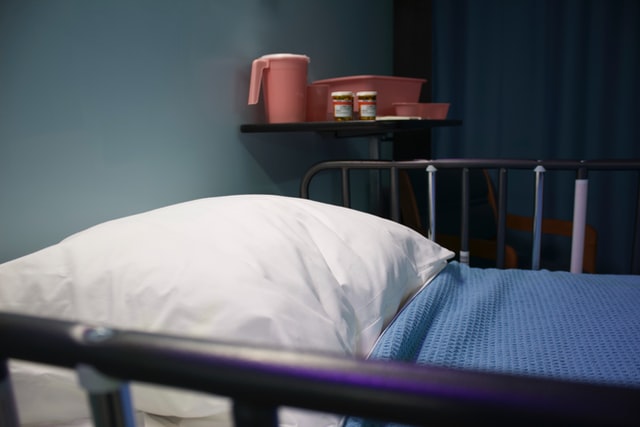Go Gentle
The parking lot is hot. Humid too, which is abnormal for these parts. We circle the facility, searching for the way in.
There’s a desk, but no receptionist. A woman in a wheelchair shares the lobby. She stares straight ahead; I doubt she knows we’re in the room. I wonder if any part of this world still exists to her. Perhaps she escaped to another world, a better world, and her body is the last, stubborn string attaching her to Earth. If she could, would she untether her connection and drift away?
After a few minutes of waiting, it becomes clear that the receptionist—if one exists—is not coming back anytime soon. My mother and I wind deeper into the facility. My mother spots a bathroom, and requests I wait. I oblige, leaning against the wall, trying to appear nonchalant. To act like none of this bothers me.
I fight the urge to escape outside, a desperate desire to suck in fresh air. I’ve been sheltered from this for far too long. I am twenty years old, and I’ve never lost anyone I was close to. There was a great-grandmother and a girl who went to my school. I didn’t know them, not well, but even those deaths were hard for me.
This is different. I know the man in the bed. He’s my third favorite person in the world, after my mother and brother. It’s stupid to rank people, I know. Mother, brother, uncle. The list stops after that. The rest of the people in my life are a muddle, all jumbled together. I couldn’t rank them if I tried. But the top three, those are easy.
A man is yelling. It’s a horrible sound, filled with agony. There are words hidden in the garbled shouting, but I don’t try to interpret them. The sound puts me on edge. I wish someone would shut him up. A twinge of guilt pricks me—this man is a person too. Then he shouts again, a warbled, haunting noise, and all I can think is shut up, shut up, shut up.
A nurse walks by and I turn my head away. To my left, there’s a man in a cot. It’s the type of bed with rails, and it’s tilted up so he’s in a half-sitting position. The bed is angled so his feet face away from me. All I can really see is his head. Did someone forget about him? Perhaps he wanted a change of scenery. But no, the hall is empty and drab, not a window in sight. There’s nothing here to be seen. He doesn’t move, I can’t hear him breathing. Is he even alive? Concerned, I listen for breath. Am I too far away to hear, or—
My mother exits the bathroom. Finally. She stops a nurse. Asks where we can find Arlin Scott. The woman shrugs and points us toward a nurse’s station. The nurse at the station knows my uncle by name. My anxiety ebbs, maybe this place isn’t as bad as it seems.
I don’t quite believe that. This place is more hospice than nursing home.
Finally. Room 501 b. My mother enters the room, steps around a man in a wheelchair. His chair nearly blocks the doorway. He says something when my mother passes, but he doesn’t move, doesn’t look her way. I hesitate, still out in the hall. Is this the right place?
My mother says hello to someone, it must be him. I take a breath and scoot past the man in the doorway. I force a smile at him. He doesn’t notice.
There are three beds in my uncle’s room. In the first is an old man in his underwear. He looks like he’s in agony. He keeps rolling this way and that as if trying to get comfortable. The second bed is empty. But there, by the window, behind a half-drawn screen, is Arlin Scott.
Hey there, he says. His voice is different than I remember—he sounds like he’s talking through water. What happened to the strong, ardent voice that railed against Obama and today’s young folk who want everything handed to them?
He’s dressed, thankfully, in pajamas, socks and slippers. He’s in bed, on top of the blankets. But he’s different. His strong voice has been soaked in water and phlegm. His legs are bent, his arms are curled upwards, his hands grasp the rails of his bed. Is that position comfortable, or the least painful?
My mother and I say hello. She stands by his bed, I claim the chair in the corner. He and my mother talk. It’s hard to hear what he’s saying. I strain my ears, wanting to remember what he says, as this might be my last time with him. He’s in good spirits, makes a few jokes. But it’s hard for him to talk. They took a lung the first time he got sick, and now his remaining one is filled with liquid.
For a while it’s nice. Small talk, catching up.
How’s your son? Is he still with Karen?
He’s alright. They’re separated, but the divorce isn’t final.
That’s too bad.
Yeah…how was your trip? Traffic bad?
No. Well, yes, it was awful. Stop and go the whole time. I let my daughter drive.
In LA? Ha, did she about scare you to death?
She sure did.
They laugh, and look over at me. I smile.
It gets more serious after that. My uncle says he won’t mind if he dies, that he hopes it happens soon, so it will be easier on his wife. My mother cries, her face screwed up like a child’s. I hold back my tears. I didn’t know my uncle as well as she did, and I feel there needs to be someone in the room who isn’t in tears.
My mother bends over his bed and holds him. He pats her back, telling her it’s okay. How often is it like this, the sick consoling the healthy?
While the two of them embrace, I wipe away the few tears I couldn’t hold in. The man in the first bed says he can’t see, fear and agony laced through the statement. The man in the wheelchair is still in the door. He makes feeble movements. I think he’s trying to move his wheelchair, but his movements are so faint I’m not sure. How did he get there? It’s obvious he can’t move by himself. So what, a nurse parked him there and left? How long has he been sitting here, alone and unable to move?
The embrace next to me breaks off. We talk about other things, I don’t know what. My uncle asks about my job at some point. I tell him it’s going well. I get a text. I peek at it. It’s from my mother. I glance at her, then read her text. It’s asking if I want my godfather to come pick me up. I must not have been hiding my discomfort as well as I thought.
My mother glances over, the question in her eyes. I shake my head. If this is the last time I get to see my uncle, I don’t want to remember that I ran away.
A nurse comes in to change my uncle’s IV. She says hello to us, but doesn’t say a word to my uncle. He asks her to fill his water cup three times before she hears him.
We stay a little while longer. At some point, my uncle starts to fade. He warned us he might fall asleep. My mother and I sit in silence. She’s squeezed onto the corner of my chair. I wrap my arms around her and hold her tight. I tell myself I’m comforting her, not trying to keep myself from running outside.
Is this how life ends? The body kept alive long after the mind has gone? Why do we fight to hold onto these people? What use is a few extra months spent writhing in a hospice bed?
I think of the poem: Do not go gentle into that good night, Old age should burn and rave at close of day; Rage, rage against the dying of the light.
Why? My uncle is not living. I admire his peace, his willingness to move on. Why should he rave? Why should he fight? We tell people to never give up. But seeing this place, I know that’s wrong. This man will never travel again. He will never walk. He has no energy to read, to talk, to live.
My uncle is nearly asleep. My mother tells him we’re going to go check into our hotel, that we’ll see him tomorrow. I have the urge to hug him before I leave, but he seems so fragile with the tubes running across his body. I settle for an awkward wave.
The world outside is bright and warm, but fresh air doesn’t bring relief. I fish the keys out of my pocket and climb into the car, wanting to get back to the real world. The world built for those of us who are not yet broken. I try not to think how someday, we will all slip to the periphery, as the new youth take our place in the sun.
If we die young, it will be considered a tragedy. If we live to be ninety, we will be considered lucky.
Yet I think, if I had to choose, I’d take a tragic death over the years-long experience of dying when I’m old. The peace of death is a gift I would give my uncle, if that power were in my hands. It’s a gift he would give himself.
It’s a gift we are denied.

Morgan Lynn Krueger is a graduate of the University of Tulsa, where she was Editor-in-Chief of The Collegian. She currently works at Sneak Peek Books as an editor. When she is not writing, she can be found acting, hiking, and volunteering at the local animal shelter. You can follow Morgan on Instagram @morganlynnkrueger.



